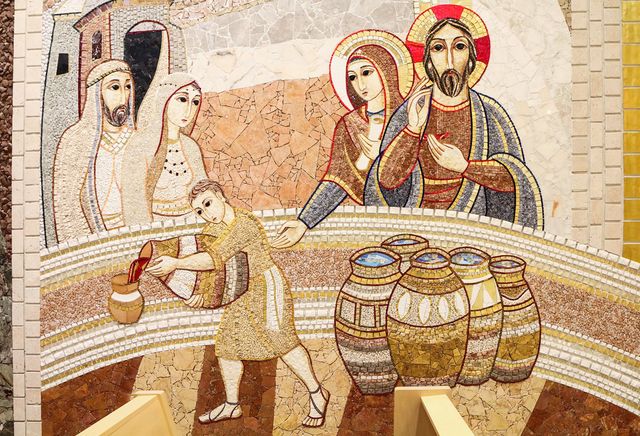
The Second Sunday in Ordinary Time
The wedding in Cana marks a key moment in Jesus' life, demonstrating His divinity and foreshadowing the impact of His ministry.
Gospel according to John 2:1-11
There was a wedding at Cana in Galilee, and the mother of Jesus was there. Jesus and his disciples were also invited to the wedding. When the wine ran short, the mother of Jesus said to him, “They have no wine.” And Jesus said to her, “Woman, how does your concern affect me? My hour has not yet come.” His mother said to the servers, “Do whatever he tells you.” Now there were six stone water jars there for Jewish ceremonial washings, each holding twenty to thirty gallons. Jesus told them, “Fill the jars with water.” So they filled them to the brim. Then he told them, “Draw some out now and take it to the headwaiter.” So they took it. And when the headwaiter tasted the water that had become wine, without knowing where it came from — although the servers who had drawn the water knew —, the headwaiter called the bridegroom and said to him, “Everyone serves good wine first, and then when people have drunk freely, an inferior one; but you have kept the good wine until now.” Jesus did this as the beginning of his signs at Cana in Galilee and so revealed his glory, and his disciples began to believe in him.

Reflections
Today’s Gospel reading contains several layers of meaning, revealing aspects of Jesus’ nature; A wedding in Cana. Jesus and Mary were invited as guests, along with the disciples. This passage shows that even Jesus took time to celebrate and that He participated in the events of His community. The wedding in Cana marks a key moment in His life, since it sets the scene for the first public demonstration of Jesus’ divinity. It demonstrates the nature of Christ and foreshadows the impact that Jesus’ ministry will have on the world.
One significant aspect of this passage is the intercession of Mary on behalf of the wedding hosts: “They have no wine.” (John 2:3) By bringing the needs of others to Jesus, Mary shows us the importance of praying for one another and seeking Jesus' help in times of need. Her request for wine is not just significant for the wedding celebration, but also for the wider narrative of the Gospel. Jesus’ miracle of provision confirms His divinity. It demonstrates the ability to create something essentially new and substantially different. In a materialistic world, we are invited to trust in Jesus’ presence and to have faith that He will accompany us as we meet our daily needs.
Just like grapes are transformed into wine that can quench our thirst, God can turn ordinary circumstances into something extraordinary and life-giving. The miracle at Cana demonstrates that our own lives can be touched and transformed by God’s grace, like the wine. Just like Mary did, we can reflect on areas of our lives that feel lacking, and present our needs to Jesus in prayer. We can trust in the intervention of God to transform these situations. He will provide for us in ways that would otherwise seem impossible.
This miracle of transubstantiation can also be seen as a foreshadowing of the Blessed Sacrament: Just like the ordinary water is transformed into wine, the bread and wine of the Eucharist are transformed into the very essence of Christ’s being. And just like the wine was a substance of joy and celebration at the wedding, the Blessed Sacrament provides spiritual nourishment for all participants in the celebration of Mass. During the Mass, the priest raises the chalice and holds it above the altar with both hands: “Blessed are you, Lord of all creation, for through your goodness we have received the wine we offer you: Fruit of the Vine, and work of human hands, it will become our spiritual drink.”
Jesus’ first miracle is brought to completion during the Last Supper, where He takes bread and wine, and transforms them into His own Body and Blood, given for the salvation of humanity (Matthew 26:17-29, Mark 14:12-25, Luke 22:7-38). The spiritual transformation of ordinary elements points to the deeper reality that Christ is the source of all life, joy and fulfillment. Every time we receive the Eucharist, we are invited to become a part of this divine transformation, and to welcome the very life of Christ into our own lives. Just as the wedding guests were nourished by the wine, where the best was saved for the end, we are invited to be nourished by Jesus’ presence and to be transformed through the sacraments.
Contemplating this Gospel message encourages us to consider our connection with Jesus and Mary. By adopting Mary's example, we are able to present the needs of others to Jesus. Trusting in His ability to supply and intervene in our lives is a gift that can be cultivated through this relationship. The wedding at Cana serves as a reminder of the delight and prosperity that arises from following Jesus, and an encouragement to have faith in His capacity to revitalize our lives. Let us, like the disciples, have faith in Jesus and walk with Him, letting our lives be enriched by the joy and amazement of His companionship.
O Sacrament Most Holy,
O Sacrament Divine!
All praise and all thanksgiving
Be every moment thine.